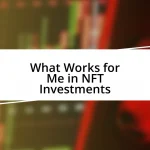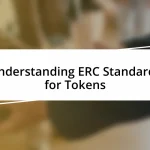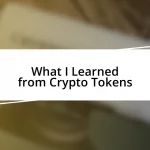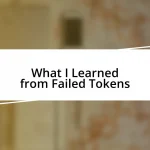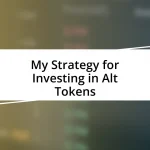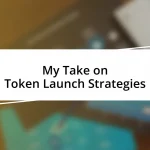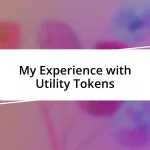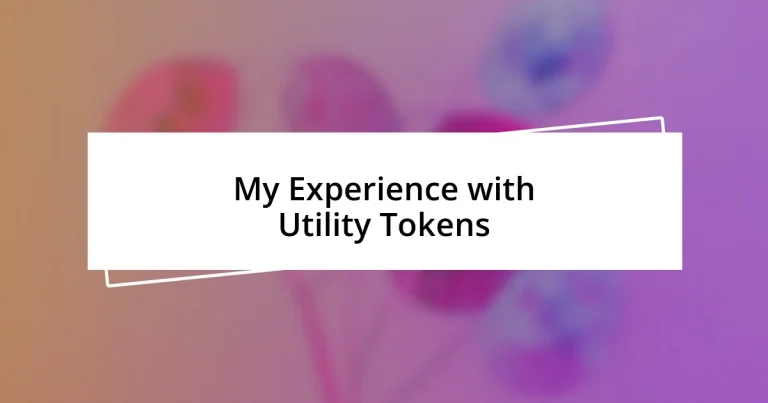Key takeaways:
- Utility tokens facilitate user engagement, innovation, and community building by offering exclusive access, voting rights, and incentives within blockchain ecosystems.
- Challenges include regulatory uncertainties, market volatility, and dependence on project success, highlighting the importance of risk management and awareness for investors.
- The future of utility tokens involves increased regulatory clarity and potential mainstream integration, enhancing trust and transforming everyday experiences into community-driven ecosystems.
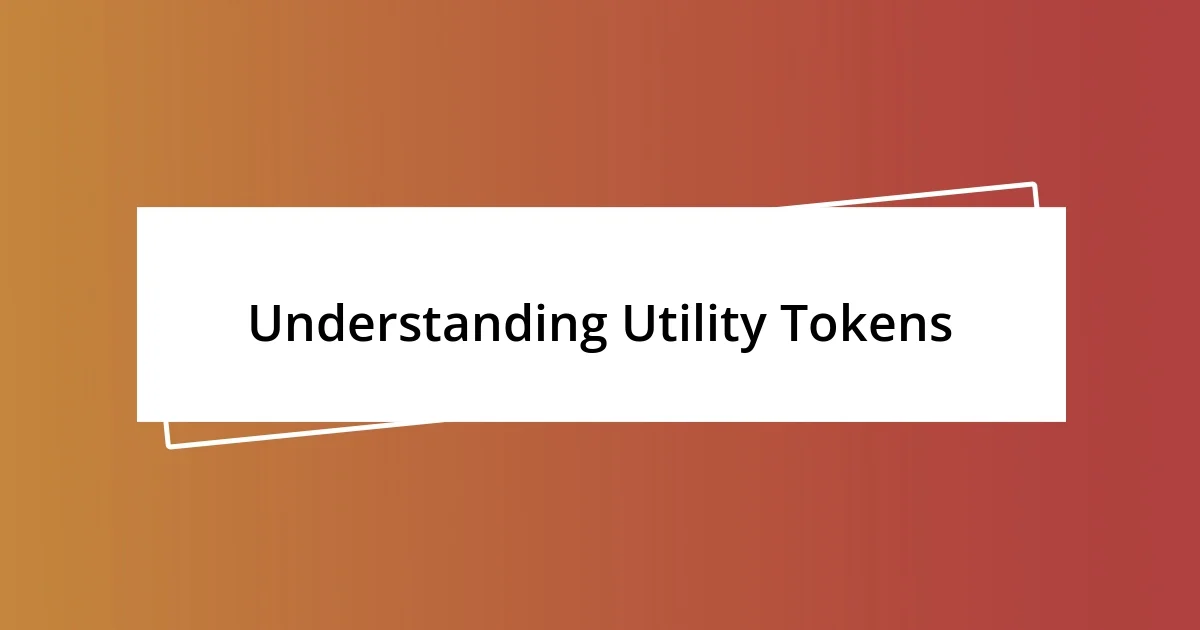
Understanding Utility Tokens
Utility tokens are unique digital assets that serve a specific purpose within a blockchain ecosystem. I remember when I first encountered them; it felt like discovering a secret key to access exclusive features in a game. The excitement of being part of a community where my tokens could grant me voting rights or access to services made me feel connected and empowered.
What stands out to me is the practicality of utility tokens. They are not just speculative assets; they offer real value! For instance, I used utility tokens to unlock premium features in a decentralized application, which transformed my experience. Have you ever felt that rush of accessing something that felt just for you? It’s that sense of exclusivity that makes utility tokens truly fascinating.
In my experience, understanding utility tokens truly involves seeing them as the fuel for specific applications within their ecosystems. They enable users to engage with platforms beyond mere investment. I’ve always found it intriguing how these tokens can enhance user interactions, shaping an entire community’s experience. How do you see yourself using utility tokens in the future?
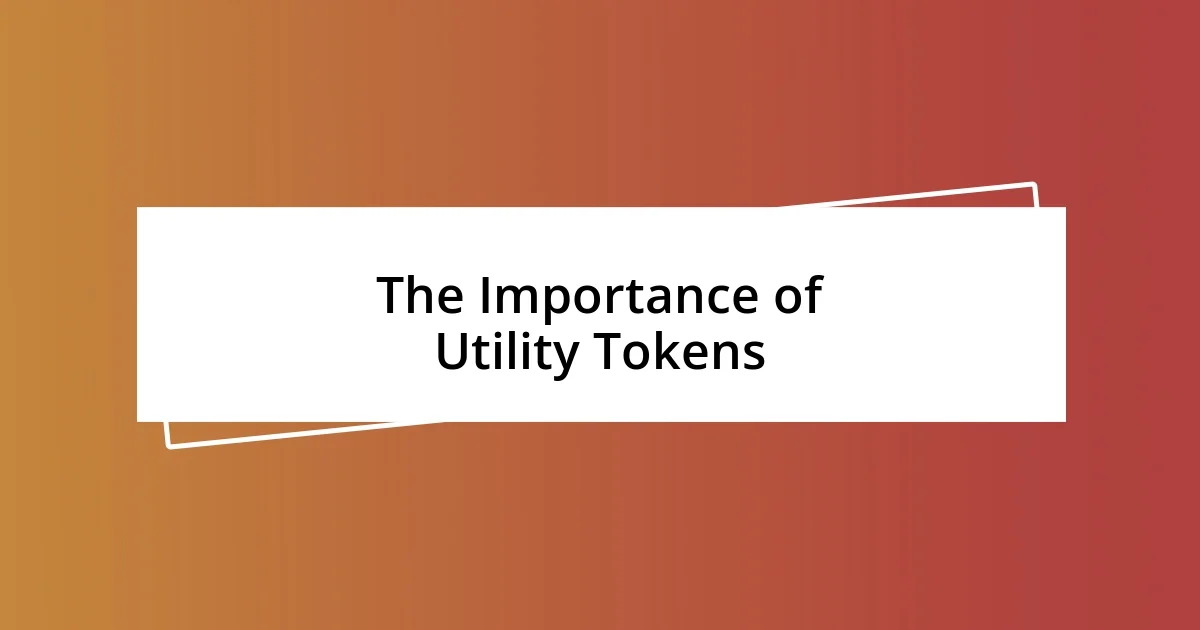
The Importance of Utility Tokens
The role of utility tokens is crucial in creating dynamic ecosystems. From my experience, they streamline processes and enhance user engagement remarkably. I recall using a utility token to participate in a governance vote for a platform I strongly believed in—it was incredibly fulfilling to know my opinion could shape the application’s future.
Furthermore, utility tokens encourage innovation within their respective platforms. They provide the necessary incentives for developers to create new features and improve existing ones. I’ve watched a project evolve as its community expanded, driven by the utility tokens that facilitated incentives for everyone involved. It’s like being part of a growing team where each contribution counts.
Finally, the importance of utility tokens lies in their ability to foster a sense of belonging among users. They create exclusive experiences that deepen our connections within a community. I remember feeling exhilarated as I unlocked a special feature that only token holders could access, knowing that I was part of something bigger—a vibrant and engaged community that shared my interests.
| Aspect | Utility Tokens |
|---|---|
| User Engagement | Enable active participation in platforms |
| Innovation | Incentivize developers for new features |
| Community Building | Create exclusive experiences for users |
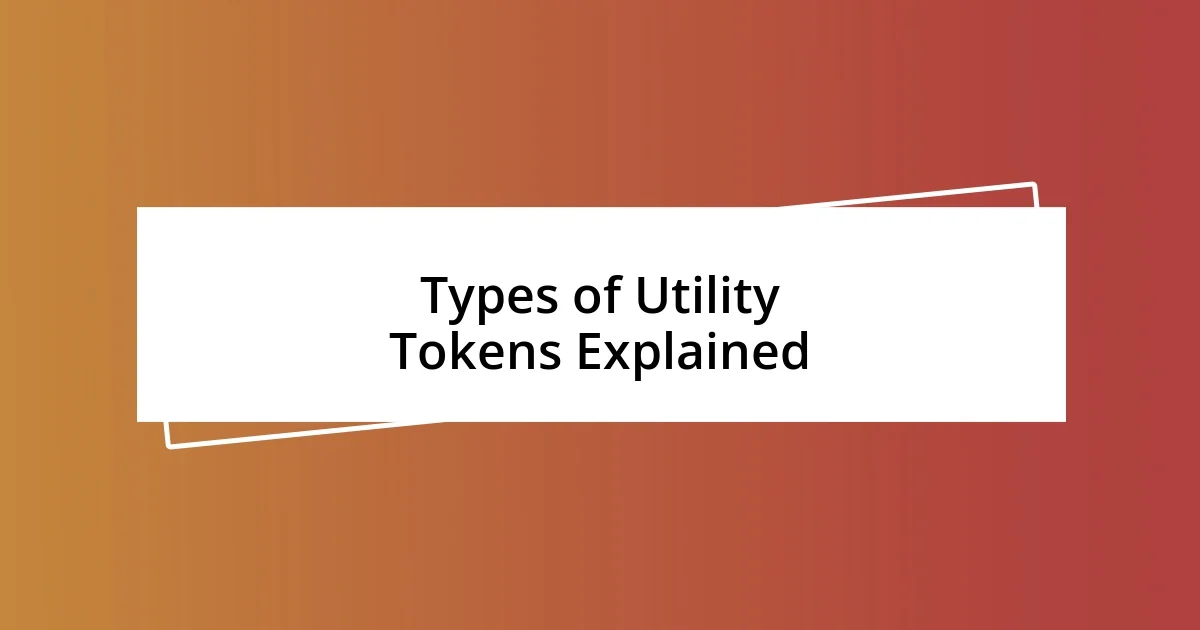
Types of Utility Tokens Explained
Utility tokens can be categorized into various types, each serving distinct functions within their ecosystems. Personally, I found that understanding these nuances can significantly enhance my engagement with different platforms. For instance, access tokens are specifically designed to grant users the ability to access specific services or features. I’ll never forget when I used an access token to unlock free in-game resources that made my gaming experience a lot more enjoyable.
Here’s a brief overview of the main types of utility tokens:
- Access Tokens: Grant permission to use specific services or features.
- Reward Tokens: Distributed as incentives to encourage participation and loyalty.
- Governance Tokens: Allow holders to vote on decisions affecting the development of the platform.
- Utility Tokens for Payments: Used to facilitate transactions within a platform, often at discounted rates.
Each type contributes to creating a richer experience, and I’ve often felt a rush when I realized how versatile utility tokens can be! They truly empower users to be a part of something more significant, and watching a community thrive as a result is something special.
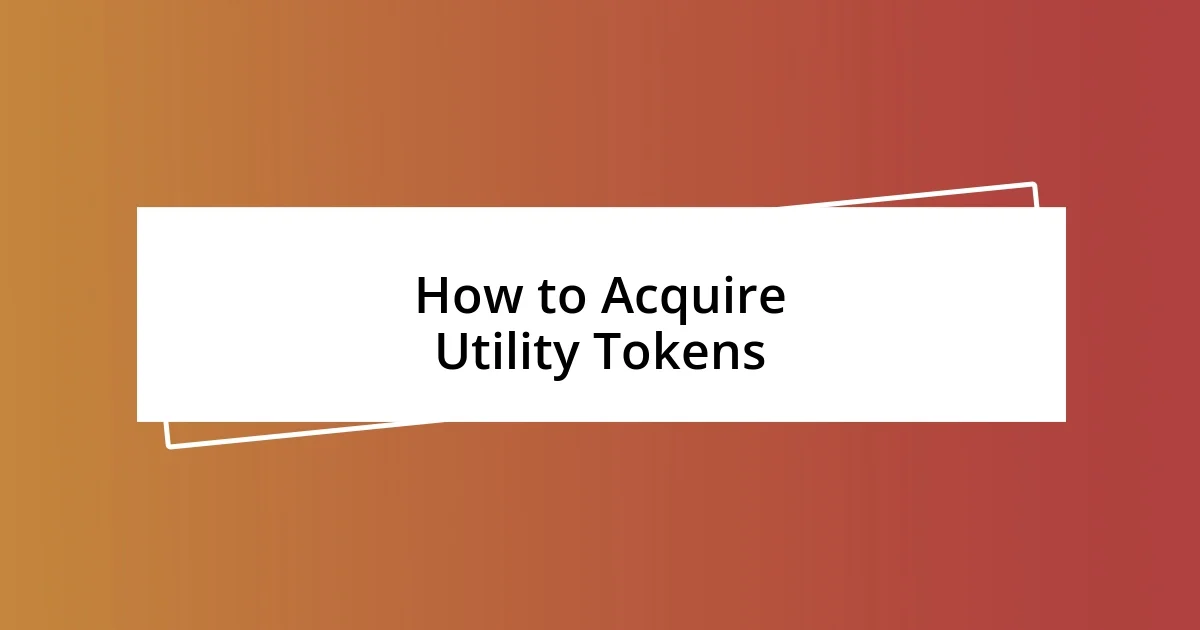
How to Acquire Utility Tokens
Acquiring utility tokens can be a straightforward process, depending on the platform. I remember my first experience involved simply signing up on a cryptocurrency exchange, where I completed some identity verification steps. It felt a bit daunting at first, but once I got the hang of it, the excitement of buying my first utility tokens was palpable.
Another way to acquire these tokens is through participation in Initial Coin Offerings (ICOs) or token sales. I distinctly recall joining one for a project I was passionate about, fueled by the potential of the platform. It was thrilling to invest early in something I believed in, and the rush I felt when my tokens were successfully allocated was indescribable.
Lastly, engaging in platforms that reward user actions can also lead to earning utility tokens. For instance, I’ve participated in online communities where completing specific tasks, like sharing content or participating in discussions, earned me tokens. It was gratifying to contribute to a community while receiving tangible rewards in return. Have you ever received tokens just for being active? The sense of accomplishment is real, and it reinforces the value of being part of that ecosystem.
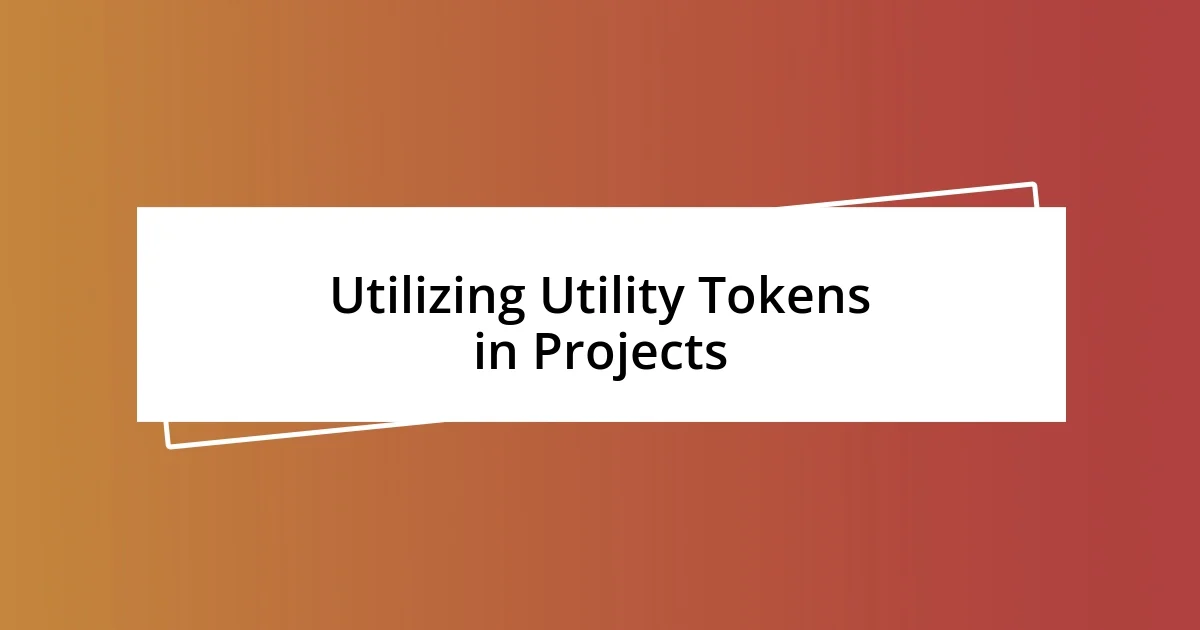
Utilizing Utility Tokens in Projects
Using utility tokens in projects can create a dynamic atmosphere that truly benefits all participants. I remember participating in a platform where I was rewarded with tokens for completing challenges. The thrill of earning those tokens made me more invested in the project, and it felt fulfilling to see my contributions recognized with tangible rewards. Have you ever felt that rush of excitement when your efforts lead to real benefits?
In addition to making interactions more rewarding, utility tokens can enhance governance in a community. I once held governance tokens for a protocol I believed in, and voting on proposals gave me a sense of ownership. It was empowering to know my voice mattered in shaping the project’s direction. This level of involvement fosters a connection that plain user engagement just can’t match. How can we underestimate the joy of having a say in something we care about?
Furthermore, utilizing utility tokens for payments can streamline transactions within projects. When I discovered a platform where I could purchase goods at a discount with its utility tokens, I was ecstatic. It felt like I was accessing a secret club only a few knew about. Utilizing these tokens not only saves money but also adds an element of exclusivity to the experience. Isn’t it fascinating how a simple token can elevate a mundane transaction into something uniquely rewarding?
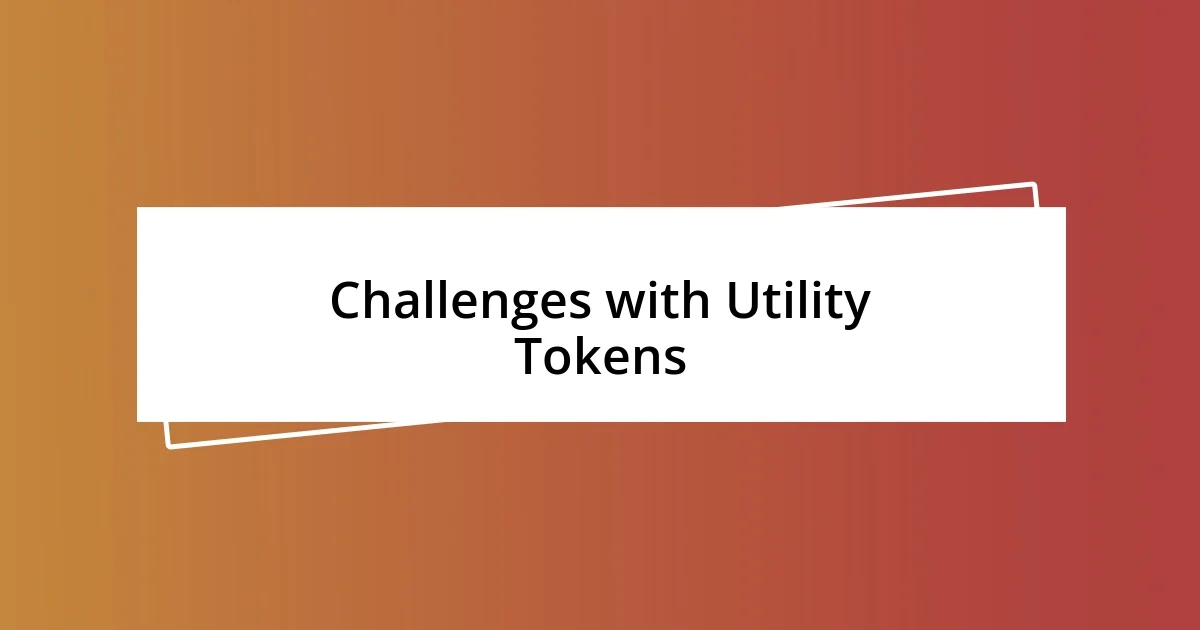
Challenges with Utility Tokens
Navigating the world of utility tokens isn’t without its hurdles. I’ve faced moments of frustration when the platforms I used had unclear regulations or unexpected changes to their terms of service. It left me questioning whether my investment was as secure as I’d hoped. Have you ever felt that sinking feeling when a favorite platform suddenly shifts its rules, leaving you in the dark?
Another challenge lies in the volatility of utility tokens. I remember investing in a project with immense potential, only to watch the value of my tokens plummet shortly after. That experience taught me a valuable lesson about market fluctuations and the need for a robust risk management strategy. How do we balance the thrill of potential gains against the reality of sudden losses?
Furthermore, I’ve observed the issue of utility tokens being tied to the project’s success, which can be a double-edged sword. For instance, I was once involved in a platform that floundered due to mismanagement, leaving my tokens nearly worthless. It’s a stark reminder that the fate of my investment was contingent upon the team’s decisions—something entirely outside my control. Isn’t it daunting to realize how vulnerable we can be in the face of such uncertainties?
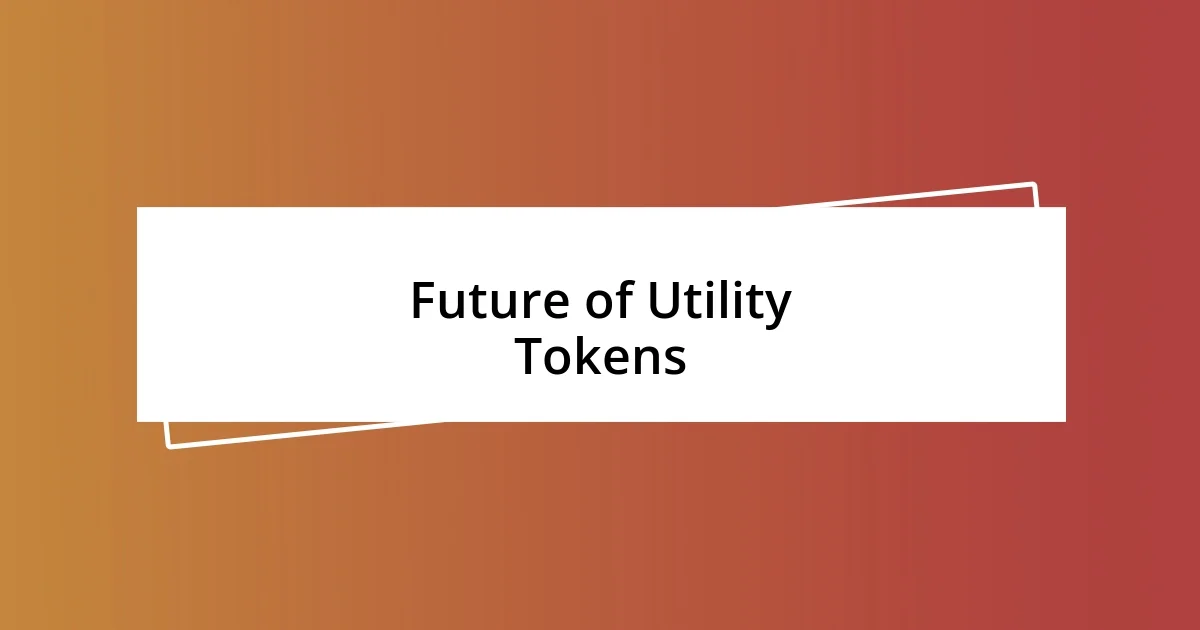
Future of Utility Tokens
The future of utility tokens is poised for significant evolution as more projects embrace their potential. I often think about a particular project I engaged with, where community-driven innovation was powered by these tokens. It was enlightening to see how these tokens could align interests, encouraging participants to contribute positively to the ecosystem. Don’t you wonder what untapped possibilities lie ahead as more people discover these models?
As we look forward, I believe regulatory clarity will play a pivotal role in shaping the utility token landscape. I still remember the relief I felt when a well-known platform gained legal approval; it felt like a huge weight had been lifted. This kind of validation not only enhances trust but also encourages new participants to join the space. How crucial do you think trust will be in driving broader adoption of utility tokens?
Moreover, the integration of utility tokens within mainstream applications is on the horizon. I can envision a future where grocery shopping, streaming services, or even local events are powered by these tokens, creating a seamless experience. I recall participating in a local event where tokens were used for entry and networking, and that sense of community was electrifying. Could it be that these tokens will soon become as common as loyalty points, transforming everyday experiences?

